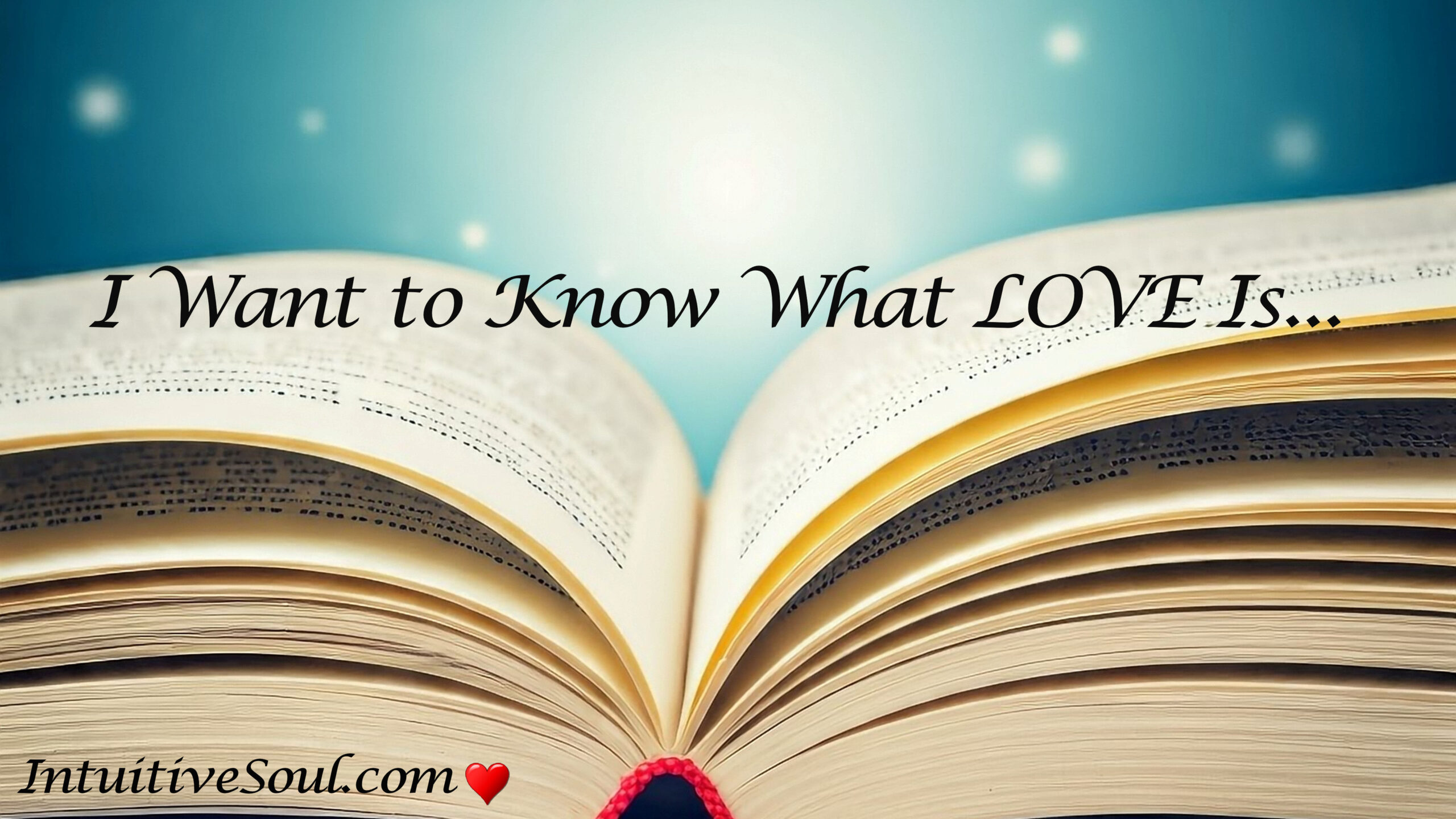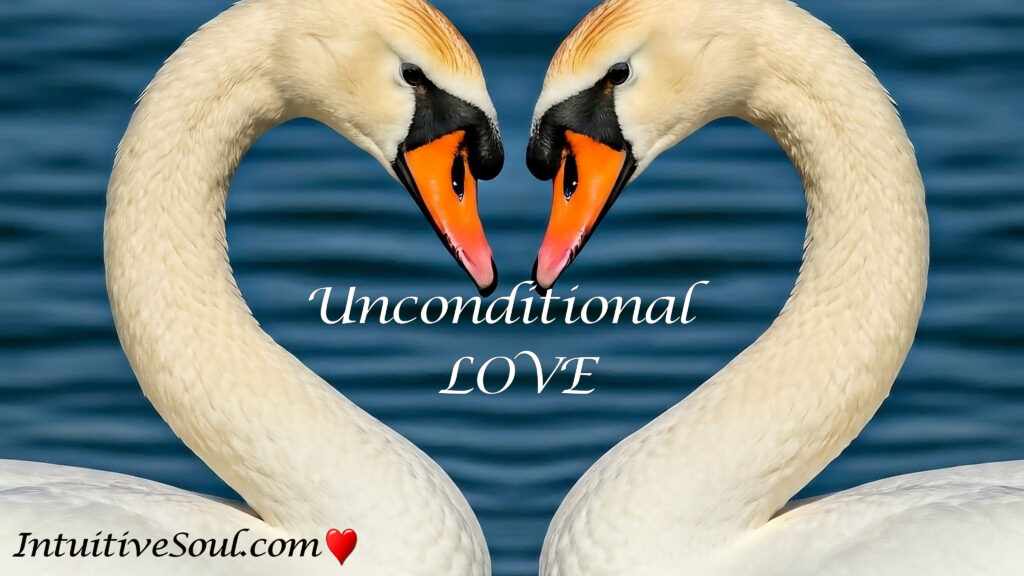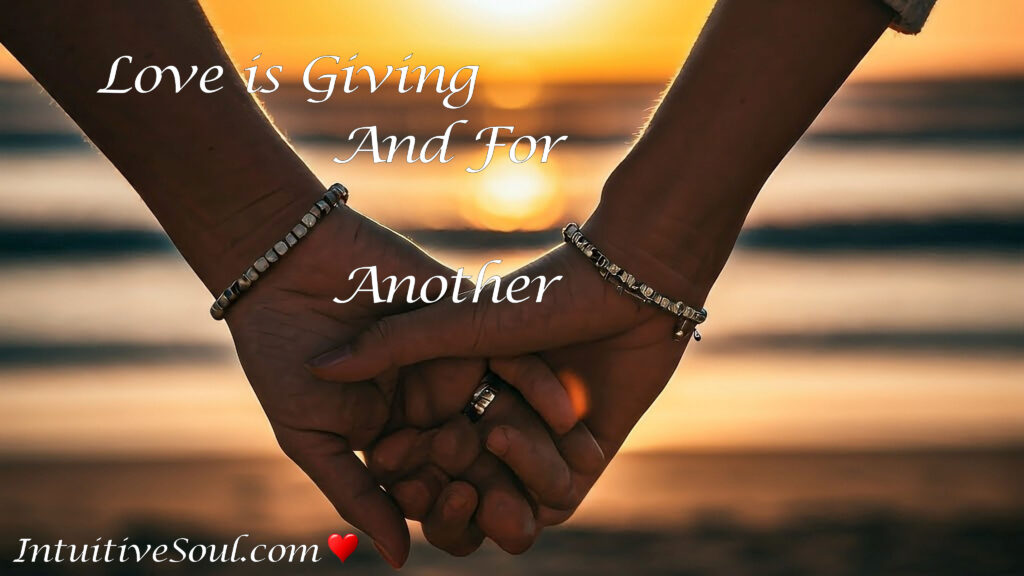I Want to Know What LOVE Is…

Besides being a power ballad released by the British American band, Foreigner, in 1984, this song allows me to contemplate the many different facets of LOVE. February, the month that hosts Valentine’s Day, is known as “Love Month” at Intuitive Soul. This annual tradition prompts reflection on the multifaceted nature of love. It’s an exploration that encompasses both the uplifting and empowering aspects of love, and the burdens and emotional baggage that often accompany it.
How many of us truly KNOW LOVE? I think that is what the song was trying to establish. Love can be a Beautiful experience. Our Media makes Love all about the “Meet Cute” – you know: the amusing or charming first encounter. However, is that Love? Or is that Like … or Lust? And what about all the HeartBreaks? The triggers, the pain, the emptiness when Love abandons us?
It is hard to Know Love – when we associate it with the fears that Love brings up for us all. Sometimes I wonder if Love isn’t really the expression we share with others. Sometimes Love is confused with our past experiences of it.
While we all may Dream of BEing in LOVE. What if our imagination is defining Love as a deeper ache we are hoping to fill? I ask this because it may be that our Imagination has an unfiltered longing for something it has defined as Love but is actually something else.
Definitions of Love
Where did your definition of Love come from? Our understanding of Love is shaped by various experiences throughout life. It might have originated from the unconditional love we received as infants when we were dependent on our parents for care. Perhaps it was influenced by our first experience of puppy love when we were lacking the emotional maturity to truly comprehend it. Love could also resemble the bond we share with a best friend. Conversely, it might be intertwined with the pain of rejection, abandonment, or the loss of loved ones.
These experiences shaped us. Let’s explore…
- Early Experiences: Our earliest experiences of love are indeed foundational. The unconditional love of a parent or caregiver, even with imperfections, shapes our understanding of what it means to be loved and to give love. However, it’s crucial to remember that these early experiences can also create attachment styles that may affect our future relationships.
- Puppy Love & Adolescent Experiences: These early romantic experiences, while often intense, are often a learning ground. They help us navigate emotions, explore intimacy, and understand the complexities of desire and connection. Even if these early relationships didn’t last, they contributed to our evolving understanding of love and relationships.
- Platonic Love: The love we share with close friends is a powerful and unique form of connection. It often involves deep trust, empathy, and unwavering support. It teaches us about loyalty, companionship, and the importance of genuine connection.
- The Pain of Loss: Experiencing loss – whether through rejection, abandonment, or the death of a loved one – can be incredibly painful. However, these experiences can also lead to profound growth and a deeper understanding of love, loss, and the impermanence of life.
- Observing Others: We learn about love by observing the relationships around us – our parents’ marriage, our family, and the relationships of our friends. These observations, both positive and negative, shape our expectations and beliefs about what love “should” look like.
So where did your definition of Love come from? Was it a combination of the list above? Do you incorporate pain and loss in your definition?
Bottomline: our understanding and definition of love are shaped by our experiences. If we witnessed our parents arguing or fighting, or experienced abuse from them, we might unconsciously associate love with pain and loss. As children, we depended on our parents for safety and love. Even if their actions were unsafe, we might have believed that it was love because the alternative — that our parents weren’t loving — was unimaginable. Our young minds might have needed to interpret this as love.
Let’s delve deeper into the complexities of love and its impact on our lives, particularly from adolescence to adulthood.
The journey of love is rarely linear; it’s often fraught with twists, turns, and unexpected detours. The experiences we gather during adolescence and early adulthood significantly shape our understanding and expectations of love. If these relationships had been fulfilling and had seamlessly transitioned into lasting partnerships, we probably wouldn’t be here, introspecting and seeking answers about love’s true nature.
Perhaps those early experiences were marked by heartbreak, disappointment, or unmet expectations. Or maybe they were simply fleeting moments of passion that burned brightly but quickly fizzled out. Whatever the case may be, these experiences have left an indelible mark on our hearts and minds, prompting us to question what love truly is and how we can find it in its most authentic and enduring form.
As a Relationship Intuitive/Coach/Counselor, I encounter many diverse experiences and perspectives on love. I hear your countless stories about LOVE – and most are about the pain of failed relationships.
Love, in its essence, is a complex and profound emotion that can evoke a wide range of experiences. It can inspire acts of great kindness, selflessness, and sacrifice, while also triggering feelings of vulnerability, insecurity, and possessiveness. The experience of love is deeply personal and can vary greatly from one individual to another, shaped by personal beliefs, cultural influences, and past experiences.
At Intuitive Soul, the exploration of love delves into these diverse aspects, seeking to understand its transformative power, its potential for healing and growth, and the challenges it presents. It’s a journey that invites individuals to examine their own beliefs and experiences with love, to challenge societal norms and expectations, and to cultivate a deeper understanding of this fundamental human emotion.

How Do We Know When We Are in Love?
This is the question. I wonder if anyone knows? I have contemplated this concept many times over my life. Our definition can definitely influence how we perceive we feel about another. We also have fears, beliefs, stories and needs.
Often our needs in relationships overpower the Love we actually search for. Tom Campbell and I often discuss that it is Needs that override our emotions. Love becomes about fulfilling what we believe we Need. Have we confused love with meeting our needs instead of the unconditional expression of an Open Heart and vulnerability of Love?
When you think about your relationships, no one wants to BE blamed for it not working. No one wants to be responsible for not BEing Love. We don’t want to BE seen as the one who misinterpreted the situation.
Our Ego’s love to get involved, especially with regards to relationships. And Ego is all about Need, having Control, and BEing in Charge. What our Egos want is an attempt to create that ‘image’ of Love that we are searching for.
However, Love isn’t Need! And our Ego doesn’t understand the complexities and nuances of the Soul and Divine aspects of Love. Our Ego can only grow through our experiences, and our Ego had to believe the definition we took as real. Our Ego is always trying to Protect us. But at what expense?
Love is Giving and For Another
I think one of the biggest misconceptions of Love is that we see a relationship as what it can Give Us. We see a potential love interest as Giving us something we Need or Want. An example would be: we search for someone who is responsible, in a fulfilling career, and who adores us. Are these bad requests? No, but they aren’t Love either.
Love isn’t what we can ‘get’ out of a relationship. It isn’t about meeting our needs. It isn’t about fulfilling a need within us or fulfilling an emptiness we perceive that exists. These types of thoughts reinforce that our Ego is in charge. We are Not nor have we ever been broken and in need of a partner to make us whole.
The problem exists because of how the Media has interpreted Love and all the fairy tales about Love. These fairy tales and how most people imagine what love is adds another level of the problem. We tend to romanticize all the gifts that we imagine we will receive: like flowers, chocolates and romantic gestures. We also believe our lives will be easier while we are in a relationship. These are all part of the fantasy we imagine in our minds that create the relationship of our dreams!
So, if ‘getting’ isn’t part of Love, what is?

Giving! Love isn’t about what we GET, it’s about what we GIVE! Love is a GIFT. We have been programmed to believe that Love is what we Get… but Love isn’t about what we Get, but What we GIVE. Think about a past relationship … one that meant a great deal to you. Think about your pets, your family, and deep love. Do you think about what you received? Or all the LOVE you Gave to these beautiful BEings.
A pet doesn’t ask for anything (Ok, they do ask for food as maybe a little more than their survival needs, LOL). However, it is what they GIVE us that brings us JOY. And when you think about them, you definitely remember all the craziness that your pets have brought into your life. However, that Love they Gave you is what you remember. And when you think of how much you love your pet, you think of the Gifts you give them, in the form of giving pets and giving food and giving play time and giving our laughter at their antics – and they enjoy laughter.
We love our pets unconditionally. It isn’t what they Give us, but what we Give them. And we don’t have conditions placed on them because how could a pet have conditions?
It would be like an infant. We can’t expect them to Give to Us. Rather it is what we Give to them. The same is what we should be offering to our partners.
The last point I want to make is that Love is for Another. Again, this is a problem with our definition or interpretation of what our Ego has determined as Love – an interpretation based on all of our past experiences with Love.
Part of the problem is that we think Love is about Us. But Love doesn’t have to do with what we want or need. We keep forgetting that Love is actually towards another. Meaning that we keep reinforcing what Love does for us, instead of what we Give to another. Our Ego’s try to make everything about us, or what we need. And that ISN’T Love. That is a concept that we continue to reinforce by our belief that it is what we Get from Love instead of what we Give.
Last comment about this, but we continue to believe that the condition we look for in Love – like a safe, financially stable relationship – is conditional. Love is Unconditional! If we Love, we Love them. We want the best for them, even if it isn’t with us. We accept that it is more important that they are Happy, irregardless of whether it is with us or another.
The Importance of Love
Love is essential for human connection and well-being. It fosters empathy, compassion, and a sense of community. It can inspire us to be our best selves and positively impact the world.
Real Love is unconditional. It has no fears. ReaI Love doesn’t try to control or change someone else. It isn’t about fixing or BEing what we want another person to BE.
Love is a universal language that transcends cultural and linguistic boundaries. It is a force that can unite, heal, and inspire. While its definition may vary from person to person, its power to connect and transform is undeniable.
This Love Month has inspired me to focus on What I can Give to my partner instead of what I want from my partner. I won’t justify my reactions of not getting what I want as a condition of how happy or unhappy I am. Because it isn’t about ME! It doesn’t mean I become a doormat and Give him everything he wants. It is an act of Love to Give Unconditionally the Love I feel and share.
I will transcend my needs to just GIVE LOVE: Unconditionally and with my Heart Open. I invite you to explore Giving and realizing the Loving Openness that triumphs all our past experiences and fears that have unconsciously become our definition of Love. Let’s create space to BE in the presence of Love. To hold Love and BE LOVE.
Happy Love Month! ❤️